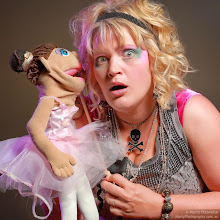I have to tell you, after this weekend just gone I am more in love with the Moose than ever. Be still my beating impulse.
There's so much I want to spill about the way these guys do things, but I'm going to resist the urge to vomit it all out in one setting and try to at least bring a little focus to each of these blog entries. So I'm going to start with something I noticed first and foremost about working with these guys, that being the way that they give feedback.
Now, I should first qualify this by saying that I've previously only experienced two major schools of feedback:
a) Focus on what went wrong during the show (or scene, if it's training) without necessarily being specific. I think harder still is when somebody says something like "I think people are having a hard time with *blah blah*" rather than actually citing a specific example or calling a particular person out on it.
or
b) Ignore all the negative and just give very affirming, positive and uplifting warm-fuzzy stuff i.e. focus on what went right.
Hence my surprise at seeing how Loose Moose operates. I remember when I was at Second City in Vegas a couple of years back, chatting with a chick there who'd previously trained with Improv Olympic. IO, she told me, were so committed to moving the story forward, that if you got on stage and said even one line that didn't achieve that end, you had to go back and try it again.
I wouldn't say that LM are that militant, however they will stop a scene early on if there's been some glaring mistake made. But while I at first found this approach took a while for me to get my head around (and my ego in check for!), several months in now and I am seriously digging it. Namely because:
- stopping the scene mid-way and analysing exactly what's gone on, while it's going on (e.g. "you just broke the promise to the audience", "you just took the option which would make you feel safe, thereby killing the story") is such an obvious, but underutilised way of getting better!
- furthermore, you get the chance to continue the scene (time-willing) or start it again, thereby immediately putting into practice what's just been taught, so you have the chance to really internalise it.
Plus of course, you realise more than ever how while it's sometimes blatantly obvious to identify what's going wrong/right from the perspective of the audience (as that's exactly what we are when we're not physically playing), being up there and in the moment is very different!
That's just the feedback side of training, however. There's also the way they give notes post-show, which, rather than being 'Oh yeah, this went right, this went well, this not so much...' is also extremely specific and with follow-up. i.e. Everybody sits down together and the senior members of the crew give feedback for each and every scene performed that night. Any glowing trouble spots are identified to be followed-up on in training the following day (e.g. a troubled big-group scene on the Friday night show, led to us doing some focused work the next afternoon on big-group scenes. How's that for logic?!)
So there you go. I'd be very interested to hear if anybody else out there has any thoughts on the feedback side of things. One thing I find hard with the LM approach is to get out of my own head once I set foot on the stage! My personal hope is that I'll get to a point where I've internalised enough of the intellectual side of improv to just forget about it onstage and trust that it is engrained enough to come through. Time will tell!
Sunday, April 20, 2008
Subscribe to:
Post Comments (Atom)


4 comments:
Wow... it seems so obvious, but it makes perfect sense.
Let's see if I can remember to put this into practice in my troupe... so many other things to remember!
There's more coming, baby!!!
I was blown away when I did a workshop with Patti Stiles to find that "moose" philosophy in practice.
I mean, I had read about it, but rarely seen people actually be honest about the work.
I think it's SO important.
Whether we're 'professional' actors or not, we are all working to create interesting work (or so I would think) - and how can we do this without feeling we can honestly give an opinion on the work?
It is taking me time to switch out of "personal attack" mode, but I think it's about trusting the people you work with too - then you can believe that they are trying to improve your work too, not bring you down in an ego death-match.
I love impro - and I want to grow, learn and become a more valuable player. I need the team's help to do that!
By the way, I am hearting the moose too, from a lot futher away....one day.....
Post a Comment